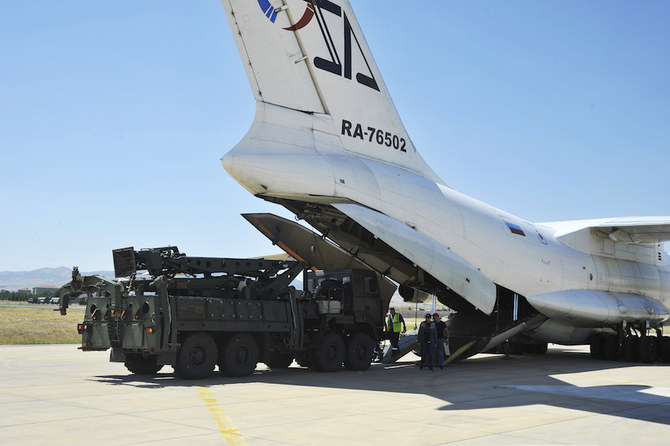ANKARA: US sanctions on Turkey have angered President Recep Tayyip Erdogan and complicated strained relations between the two countries, experts have said.
The new sanctions follow Turkey’s controversial purchase and testing of the Russian S-400 missile system.
“Despite our warnings, Turkey moved ahead with its purchase and testing of the S-400 system from Russia. Today’s sanctions on Turkey demonstrates the US will fully implement CAATSA. We will not tolerate significant transactions with Russia’s defense sector,” outgoing US Secretary of State Mike Pompeo said.
The decision was announced as part of the Countering America’s Adversaries through Sanctions Act. It includes a ban on all US export licenses and authorizations to Turkey’s Presidency of Defense Industries (SSB), as well as asset freezes and visa restrictions on the SSB president and three other employees.
The SSB is also barred from receiving US loans of more than $10 million, banned from receiving support from the US Export-Import Bank, while Washington will also use its clout in international financial institutions to block loans to the agency.
The main objective of the sanctions is to penalize significant transactions with Russia, like the $2.5 billion missile system bought from Rosoboronexport, Russia’s main arms export entity. The system was installed in Turkey and tested in October last year.
Although the US president can remove the sanctions if Turkey abandons the Russian missile system, Ankara has stood by its decision.
Madalina Vicari, an independent geopolitical analyst, said that if the Biden administration decides to move ahead with tougher sanctions, it would be a “political signal” to show that US wants to revamp its relations with Turkey.
“The restrictions over the export licenses are the most severe of all sanctions, but even it could have been worse,” she told Arab News.
Turkey condemned the “unilateral” sanctions, saying it will retaliate at “the right time.”
Turkey’s main opposition party CHP also strongly criticized the sanctions, saying the purchase was “Turkey’s sovereign decision.”
CHP deputy and former ambassador Unal Cevikoz said: “S-400s should be activated as soon as possible.”
Experts have different explanations as to why the US did not select tougher sanctions, such as preventing Turkish access to the SWIFT international banking system.
“Hard sanctions would have heavily impacted Turkey’s economy, which is already facing difficulties, and they would have affected US-Turkey relations for the worse. The goal of the outgoing US administration isn’t to antagonize Turkey, and neither to leave to the future administration a hot potato,” Vicari said.
However, she added that harsh sanctions and the subsequent economic penalty would have been “heavily weaponized” domestically through public rhetoric.
“And that wouldn’t have helped the opposition either, because a crippled economy would take more time to recover. It would have pushed the opposition into the corner. They couldn’t support them too much,” Vicari said.
An hour before Washington announced the sanctions, Turkish President Recep Tayyip Erdogan expressed his anger over the decision.
It is the first time that the US has sanctioned a NATO ally in the history of the alliance. The unprecedented decision could also affect European suppliers of the SSB, like major Italian defense companies that could cut cooperation with Ankara because they are also major suppliers to the US.
Turkey expert Matthew Goldman from the Swedish Research Institute in Istanbul said the US sanctions could have been more harsh by taking aim at the fundamentals of the Turkish economy or targeting higher-ups in the Erdogan government.
“The Magnitsky Act was used to sanction Erdogan’s justice and interior ministers in 2018 to secure the release of the imprisoned US preacher Andrew Brunson, which had an immediate impact on the Turkish economy,” he told Arab News.
“With these recent CAATSA sanctions, however, the State Department avoided targeting officials close to Erdogan and presented them with a somewhat conciliatory speech, reminding people that Russia is their real target here, and not Turkey,” Goldman added.
Presidential Communications Director Fahrettin Altun opted for a softer tone in his first public comments following the sanctions. He called for dialogue and emphasized “the strategic partnership between Turkey and the US,” tweeting: “We remain hopeful that the US will reverse this grave mistake without delay.”
According to Goldman, Turkey’s reaction was strong, but “could have been stronger.”
He said: “They promised they will retaliate and expressed indignation that, as a fellow NATO member, they would be treated this way. Still, they also left the door open to dialogue.”
The sanctions will mainly hit Turkey’s defense sector as the US imported $531 million worth of defense goods from Turkey in 2020. The Turkish defense industry is heavily reliant on US-made parts.
Goldman said that Turkey might respond by accelerating efforts to diversify its defense supply chains away from the US, working more closely with Ukraine and other countries, as well as producing more parts locally — a strategic shift that will take time and “has its own limits.”
He said: “Since 2018, the US Congress has already been quietly blocking some defense exports to Turkey for projects like F-16 upgrades, the T129 helicopter and MILGEM warship, which Turkey is trying to sell to Pakistan. Turkey has already responded by developing its own engine for the T129 to replace blocked US engines.”
For the incoming Biden administration, Goldman said that the US Congress — including both Republicans and Democrats members — will preserve its “very anti-Erdogan” as well as “anti-Russian” stance, and will continue to push a hard line against defense sales to Turkey.



























